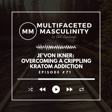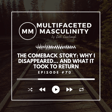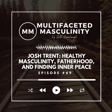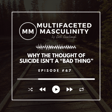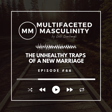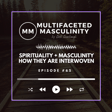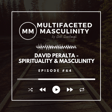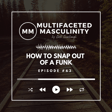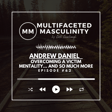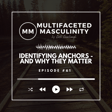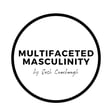Become a Creator today!Start creating today - Share your story with the world!
Start for free
00:00:00
00:00:01

Five Reasons the Five Love Languages are Broken | Ep. #17
You've likely heard of the five love languages, but did you know they can become detrimental if you misapply them? Today we dive into the five ways most people (with good intention) try to integrate the love languages only to find they've created a mess.
URL's
Host: JoshCearbaugh.com
Podcast: MultifacetedMasculinity.com
12 Week Course: Jumpstartyourlife.com
Free 15 Minute Consultation: Click Here
Transcript
Understanding Masculinity
00:00:00
Speaker
Men, we are not simple, chest-thumping, rock-smashing, fire-starting barbarians. We have depth. We intensely feel. We are scared, yet brave. We love to have fun. We're imperfect and make mistakes. We're compassionate and loving. We are multifaceted. Let's explore the reality of masculinity together.
Engaging with Love Languages
00:00:29
Speaker
Today's episode, I have a request and that is that you set aside time or enough time to be able to listen to the entire podcast and not jump to conclusions when I bring up certain points about the love languages.
00:00:44
Speaker
Just because I think it's really important to develop these five points in their entirety and they really do build on one another. So just try to bear with me. And if at the end of the podcast, you still feel like one of my points is incomplete or just fundamentally wrong, you're always more than welcome to reach out. And that's just at multifacetedmasculinity.com forward slash question. And I love to have a dialogue around any of these topics that we dive into.
00:01:14
Speaker
And as always, if you haven't already, subscribe to the podcast so that that way you don't miss any future episodes. Okay.
Introduction to Love Languages
00:01:21
Speaker
Let's go ahead and dive into the five broken aspects of the five love language.
00:01:39
Speaker
All right, I know that I am treading on holy ground for some people. And let me first just say, my goal is not to knock the love languages. I actually like certain aspects about it. But I do think that it's incomplete at its core. And if you miss some of these things that we're going to cover today,
00:02:02
Speaker
or if you misapply the love languages in an effort to either receive or communicate love, then you're actually creating more problems for yourself than you are helping yourself, even if it's out of good intention. Just in case you don't know what the five love languages are, real quickly, they're words of affirmation,
00:02:22
Speaker
quality time, receiving gifts, acts of service, and physical touch. And the theory is basically that everyone has one primary. I've also heard that you may have up to two out of the five are primary.
00:02:38
Speaker
Now, I am not going to go into a full-blown training on the five love languages. People that have dedicated hundreds of hours in teaching the five love languages. So if you aren't familiar with those, I would say a starting point is to dive into understanding what those five are. Like I said, there's actually really good attributes and logic and understanding behind those five.
00:03:03
Speaker
Okay, so why are they broken? And let me start by clarifying that point, which is the five in and of themselves at the core of what they represent, those are not necessarily broken.
Limitations of Personality Frameworks
00:03:16
Speaker
What is broken is the way that we interpret them,
00:03:20
Speaker
or the way that we misapply them to our own lives. And that's really what I want to spend time on today is how essentially we break them in the sense of taking something that is a really great concept and running it through certain lenses or creating certain limitations.
00:03:41
Speaker
And that's actually my first point on this is that for some people, learning about the five love languages is a lot like taking a personality test. And what I mean by that is if you take a personality test, let's say the strength finders or Myers Briggs or disk or a variety of other ones that are out there, what can happen is when you get the results from that test,
00:04:05
Speaker
It's really great. It moves you in an understanding of self-awareness in who you are, but it can also box you in. It actually makes you in certain ways preconceive your approach to certain situations and you can fall into a default of
00:04:21
Speaker
Well, this is just how I am. This is how I'm wired, quote unquote. And when you do that, you're limiting yourself in the sense of personal growth and development, because we all have past experiences that either taught us certain mindsets or we experienced trauma or whatever it may be. And in that, when you take a personality test and you apply the results to yourself and say, this is who I am.
00:04:47
Speaker
What you're doing is you're putting a cap on your ability to grow and to mature and to, in a lot of ways, change some of that personality that you may be carrying around. I know for me, a practical example of that is I took the disc test and
00:05:06
Speaker
The results I had was I was like through the roof D and everything else was at or below 10 for IS and C. And really what that was is it was a time in my life when I had just gotten out of the Marines. I was extremely detached from my heart. I still hadn't processed through a lot of the pain connected to my childhood. And so I used the negative attributes of a D to protect myself, to keep people at bay.
00:05:32
Speaker
And as I got healing and as I became more self-aware and as I grew and then took the test 10 years later, it came back that I was by default, I was actually a really high I. And my second highest was D. I still have part of that in me, but it was way out of proportion when I hadn't grown as a person.
00:05:53
Speaker
Now, we're not talking about personality tests, so how does that apply to the love languages?
Expressing Love Beyond Labels
00:05:58
Speaker
Well, the same is true where if you begin to dive into these love languages and you say, you know what, words of affirmation, that is by far my number one approach to love or how I receive it or how I give it. What you can do
00:06:14
Speaker
is fall into a place where you're actually looking for that or looking for ways to express that, and inadvertently you disconnect from creative or unique ways of expressing love to others, and you begin to run love through that lens or through that filter, even if you have an understanding of all of them. In essence, you box yourself in. You limit the way that you can receive or express love
00:06:42
Speaker
When in reality they're fluid they change over time they change as you grow as you mature as you change in relationship as you have life experiences. The strongest or stronger way that you connect to one of these five.
00:06:59
Speaker
that is going to change. And so if you treat it like a personality test and you box yourself in, then in the long run, you're actually putting a glass ceiling on your ability to connect to and express and receive love. Now, another way that it's limiting, a lot of it is outwardly focused. And what I mean by that is if you have two people in a relationship and they have differing love languages,
00:07:25
Speaker
then the way that you're trying to express the love is you're constantly looking for how do I go outside of the way that I best connect to love to then express it or to receive it or to fall in line with what that other person may be looking for. And I understand love is selfless, love is kind, love is patient.
00:07:48
Speaker
All of that is true, but the point of today's podcast is more so to keep you from grabbing a hold of the extremes where you can take something that's really beautiful, like the love languages, and misapply them. And so if all of a sudden your partner is gifts, well then you can actually become resentful towards the expression of gifts for love because you're like, man, I just bought flowers last week and she's bringing up the fact that I almost never bring her flowers anymore.
00:08:17
Speaker
And so instead of it becoming a genuine expression, because it is outwardly focused, if you stay in that lane or that pocket exclusively, in the sense of trying to express your love to the partner in the way that the partner receives it exclusively, then as time goes on, it can disconnect you from your own ways that you express and receive love.
Codependency Risks
00:08:40
Speaker
the second thing is it can lead to codependence because your heart it could be starved for one of the love languages because you had maybe a deficit from your childhood it doesn't necessarily mean even that it's your love language it just means that there was an extreme lack of that in your childhood so let's use an example far too many men can connect with it which is
00:09:02
Speaker
their dad never said that they were proud of them or that they never said that they loved them or said it very very little and the majority of the training or teaching was in ways that you did it wrong or could improve and so on and so what happens is your heart is out of a an extreme lack it's starved for that love language and when you begin to learn about these and you go oh yeah that's it that's the one well what happens is it leads to
00:09:28
Speaker
your partner essentially becoming your God in certain ways of when it comes to love because their words carry more weight than they should in a healthy way. And I know this from personal experience because I had the dad that wasn't very communicative when it came to expressing things.
00:09:45
Speaker
And so inadvertently what happened was when I met my ex-wife and her dad, he was someone who wanted to teach, wanted to train, etc. And same thing with then ultimately my wife at the time, all of a sudden I was looking to her rather than looking to God in certain ways to fill that pain that was in my heart, that longing that was in my heart.
00:10:07
Speaker
It wasn't even necessarily one of my strongest love languages, but my heart was longing for it in a way that I was looking to the physical, tangible representation of someone else that could heal that area of my heart or fill that area that it was starved when I was younger.
00:10:23
Speaker
And so all of a sudden, if they're not expressing things or sticking with words of affirmation, if they're not expressing things, then all of a sudden that pain becomes even more exposed. And essentially you get triggered, but you don't know what to do with it. You don't understand that you are.
00:10:40
Speaker
And when somebody gets into your God spot in that unhealthy way, you become codependent on them because you rely on them to actually speak into your identity or love you in a way that it's their responsibility to heal that part of your heart. Well, you know what? It's not. No one's girlfriend or wife should be responsible for healing your heart no matter what you went through. Does it happen through intimacy and relationships some? Yeah, it does. Totally.
00:11:09
Speaker
But when you put that expectation and responsibility on them, what you're actually doing is you're pushing them further away because your heart becomes more and more hungry for that affirmation or gifts or acts of service or physical touch. And so you become codependent with them because you need them to fill that
Pitfalls of Love Language Focus
00:11:27
Speaker
void.
00:11:27
Speaker
The third thing is it can negatively affect the relationship. And even though it's good and understanding the ways that you receive and express love is important, what it can do is it can turn into a scorekeeping relationship. Meaning if you are so focused on expressing love in the way that they have identified as the most important for them, let's say that it's gifts, well, then you can all of a sudden go, you know what? In the last month,
00:11:57
Speaker
this is subconsciously you're not actually writing it down and keeping a tally but internally you're going you know what I bought her flowers twice this month and I get her a coffee every week and I've done all these other things that were gifts for her and I have to ask her to do really simple things let alone go above and beyond to express her love for me
00:12:17
Speaker
And so you fall into this score-keeping relationship where you actually use the love languages against, inadvertently, but you use them against your partner as a means of keeping tally. True love is unconditional, meaning you give the love without an expectation in return. And that's a risk you have to be willing to take.
00:12:40
Speaker
Another way that it can negatively affect the relationship is you can be completely disconnected from your heart, but find acceptance or love in your ability to determine what their love language is.
00:12:54
Speaker
So let's say the other person doesn't even know what they are. Well, if you're disconnected from your heart, and what I mean by disconnected from your heart is you are somebody who is just rough and tough and doesn't cry and doesn't feel and doesn't express themselves in any way that may be scary or vulnerable when you're disconnected from your heart.
00:13:14
Speaker
And so you can be very disconnected and yet find a sense of acceptance from the other person in your ability to perform for love. So it traps you into this state of performing where you feel an obligation to continue to connect to the person through the avenue that they have expressed is the most important for them and you're never fully yourself.
00:13:39
Speaker
You're always looking even beyond just the girlfriend or wife, just in any relationship, you're looking for how do they express love. Okay, well, in order for me to be accepted, then I need to exclusively love them in that way. And the more that you perform, the more that you get disconnected from your heart.
00:14:01
Speaker
So it can put you into this trap where you may seem like a really loving person but you hate yourself or you are always beating yourself up or you just feel empty or disappointed or depressed.
00:14:17
Speaker
even though you're really good at expressing love in the ways that other people receive it. And you find true connection when you disconnect from that performance and begin to identify the ways that you receive love and you express love, even if it's outside of these five, which we'll get into in a second here. And the fourth reason is because what you may think is your love language or your number one or number one and number two
00:14:42
Speaker
may not be it at all. Going back to my example of if you were starved for it and you're looking for it, well the extreme opposite of that can happen, where past trauma actually masks the healed version of you being able to receive and express love.
Trauma and Love Perception
00:15:01
Speaker
And I'll give you an example of that. Let's say that you are molested as a child, which is horrible on so many levels. But because of that, you have just dismissed that touch is one of your primary love languages. So it's not out of a lack, but it's out of trauma. And so you disassociate love and touch.
00:15:22
Speaker
And you say, those two can't be together because touch is a direct connection to pain. Or maybe another one is if you grew up in a home that financially struggled when you were young and you had birthdays or Christmas where you didn't get presents, your pendulum can swing one or two ways. It can go into the starvation mode, which is I'm going to give my kids so many presents that they'll always be happy.
00:15:47
Speaker
even if it's financially irresponsible to do. Or, yeah, gifts aren't really my love language. I never really got them growing up and so I just don't connect to it. And so in the book and just teachings that I've heard, it doesn't account for these. It doesn't account for the trauma piece or the starvation piece.
00:16:03
Speaker
Lastly, I think it's important to understand that it's one tool. It is not THE tool for relationships. Let's use marriage as an example. For marriages to thrive, they need to continue to grow. They need intentionality, honesty, trust, fun, commitment. You need shared goals and values.
00:16:23
Speaker
You need so many different things than just, hey, how can I connect to or express these one or two ways that you connect to love? It also doesn't teach you at all how to manage conflict or what to do when you're triggered. Because let me ask you a question. If you have pursued the five love languages and you feel like you really have an understanding of them,
00:16:46
Speaker
and they've really fundamentally changed the way that you connect to your wife or your girlfriend. Do you take those into account when you're in the middle of an argument? Do you think about them when you're triggered? If you do, please reach out to me because you'd be the first person I've ever heard of.
Evolving Use of Love Languages
00:17:02
Speaker
And my point with that is that we're talking about the extremes that you can fall into. And one of those extremes is you see the five love languages as the tool that defines the strength of your marriage. It's the pulse of your marriage. It is what you're constantly learning how to connect through and express from. It is the cornerstone. And I don't think that's a bad thing, but it can become detrimental if you're so focused on that.
00:17:28
Speaker
that you aren't taking into account so many other things that it takes to have a thriving relationship. And lastly, I guess I have a few more than five points, but you need to keep in mind that your love languages change over time. And I've kind of alluded to that some, but five years ago, you may have identified one or two things
00:17:48
Speaker
within these five, but five years later, if you are moving towards health and emotional awareness and just growth in general, there's a really good chance, kind of like me with a disc test, that as you get healing, the ways that you connect to someone or express love will change over time.
00:18:09
Speaker
The bottom line is people change. So don't box your significant other in, don't box yourself in, and don't let these love languages become the only avenue that you explore to find connection and learn how to thrive within relationship.
